Level 4 Digital Tourism: Innovative Digital Showcase News Report
VerifiedAdded on 2023/06/18
|10
|657
|263
Presentation
AI Summary
This presentation provides an innovative digital showcase focusing on the digital transformation within the tourism industry, particularly highlighting TUIT Germany. It addresses the global adoption of touchless travel accelerated by the COVID-19 pandemic, innovations in the booking process, and the rise of staycations and virtual travel. The presentation also examines the increased inequalities in digital connectivity affecting access to travel bookings. The conclusion summarizes the key advancements and the role of technology in enhancing the tourism sector, referencing books and journals for support.
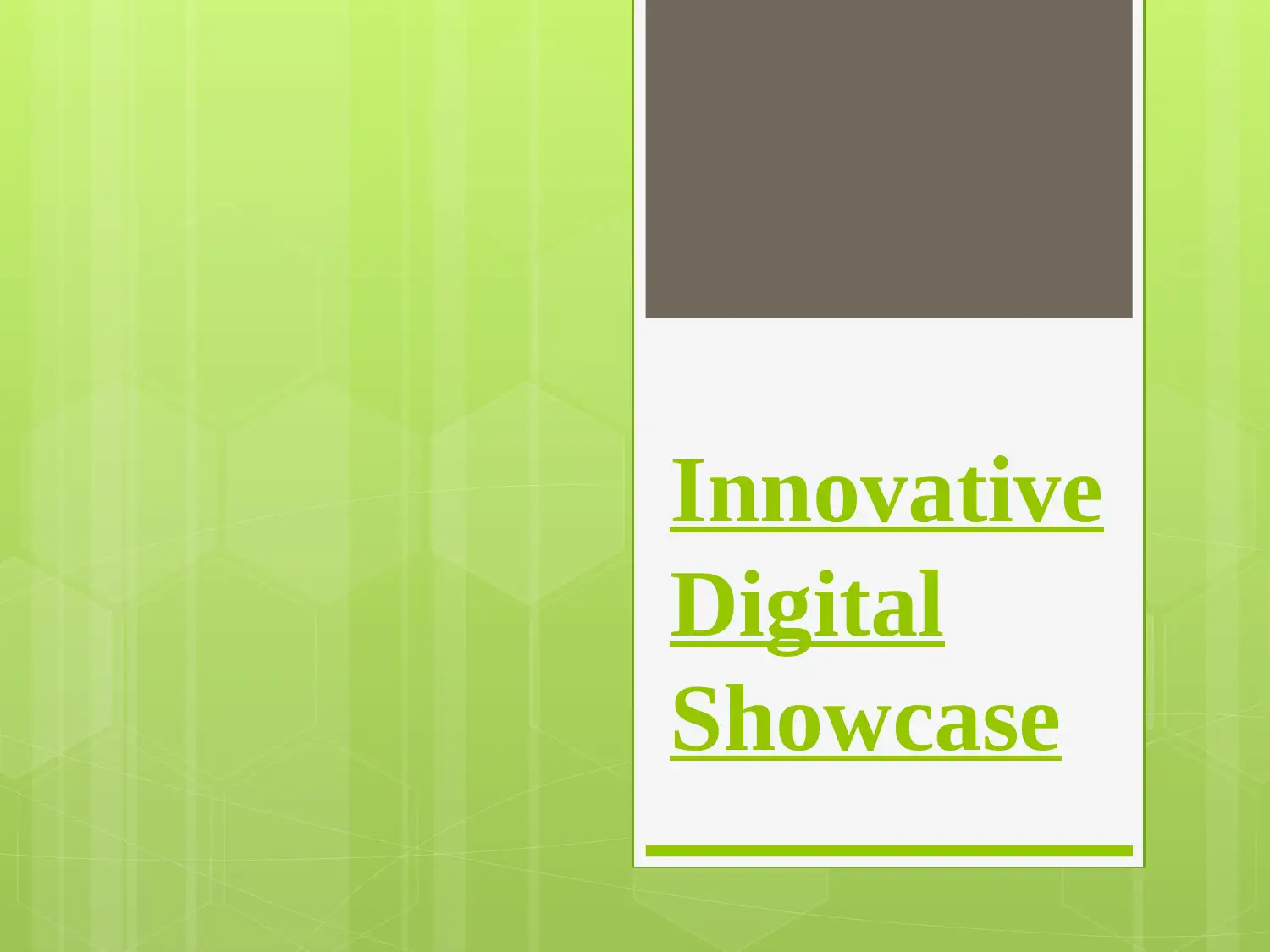
Innovative
Digital
Showcase
Digital
Showcase
Paraphrase This Document
Need a fresh take? Get an instant paraphrase of this document with our AI Paraphraser
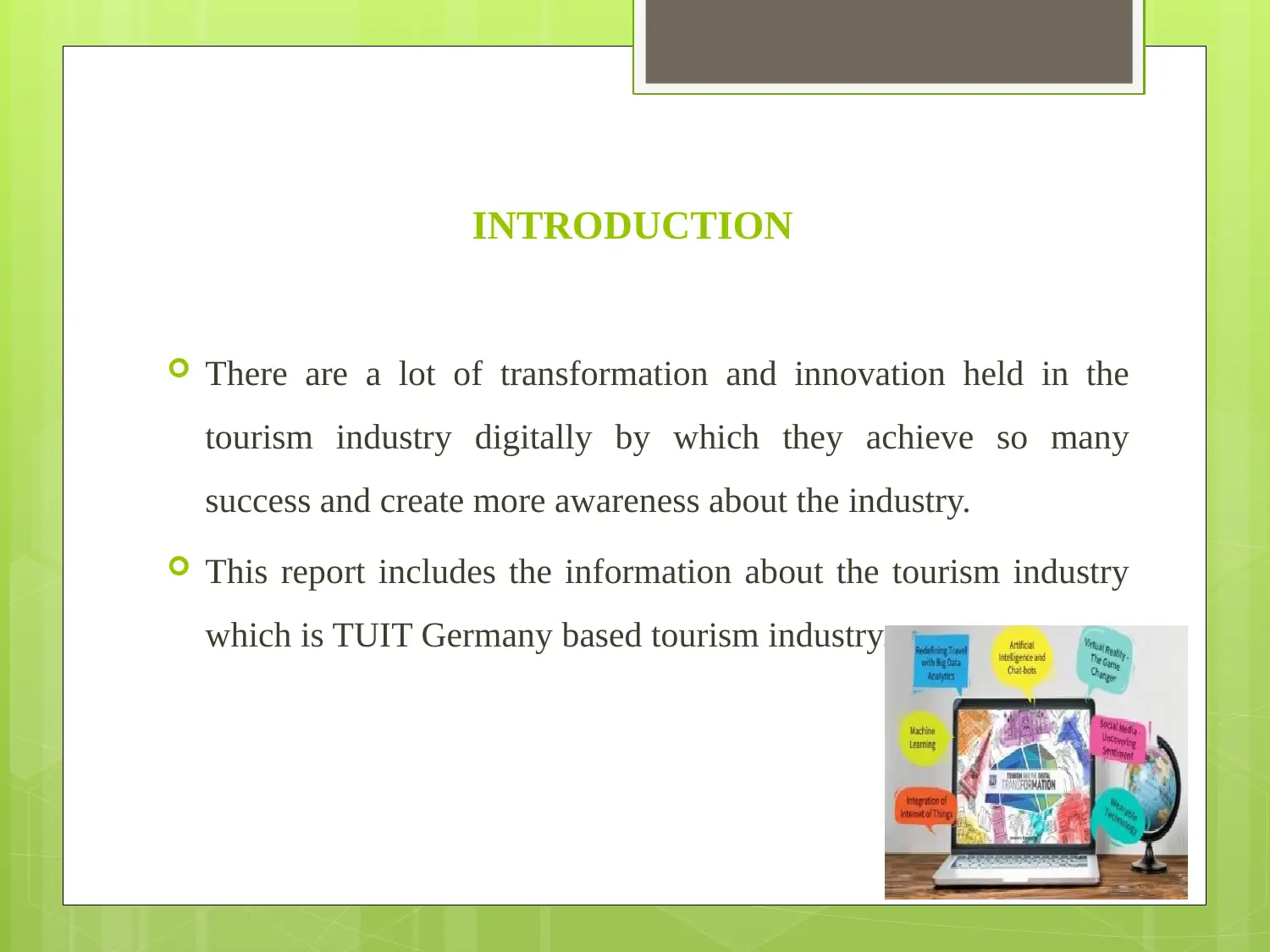
INTRODUCTION
There are a lot of transformation and innovation held in the
tourism industry digitally by which they achieve so many
success and create more awareness about the industry.
This report includes the information about the tourism industry
which is TUIT Germany based tourism industry.
There are a lot of transformation and innovation held in the
tourism industry digitally by which they achieve so many
success and create more awareness about the industry.
This report includes the information about the tourism industry
which is TUIT Germany based tourism industry.
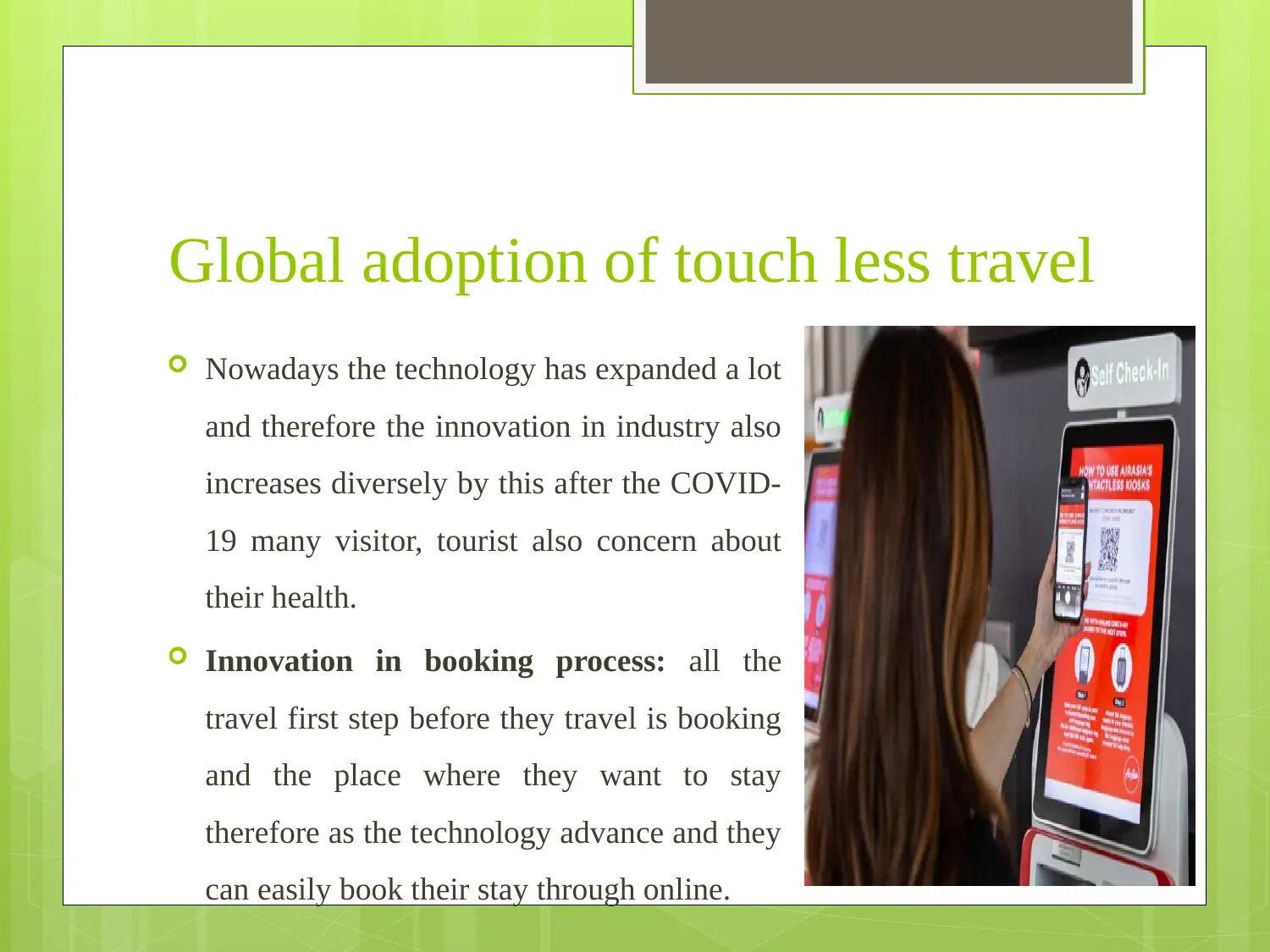
Global adoption of touch less travel
Nowadays the technology has expanded a lot
and therefore the innovation in industry also
increases diversely by this after the COVID-
19 many visitor, tourist also concern about
their health.
Innovation in booking process: all the
travel first step before they travel is booking
and the place where they want to stay
therefore as the technology advance and they
can easily book their stay through online.
Nowadays the technology has expanded a lot
and therefore the innovation in industry also
increases diversely by this after the COVID-
19 many visitor, tourist also concern about
their health.
Innovation in booking process: all the
travel first step before they travel is booking
and the place where they want to stay
therefore as the technology advance and they
can easily book their stay through online.
⊘ This is a preview!⊘
Do you want full access?
Subscribe today to unlock all pages.

Trusted by 1+ million students worldwide
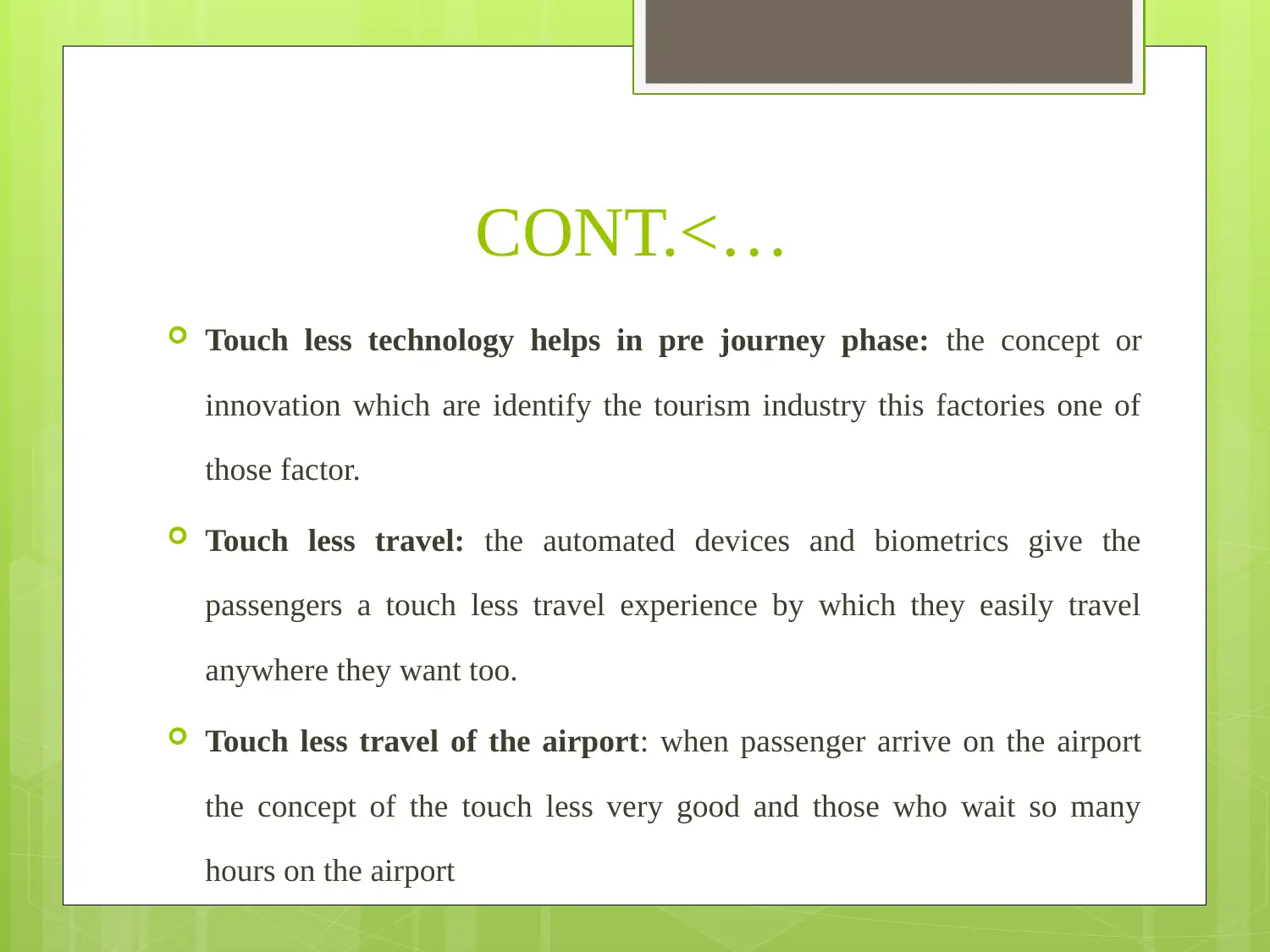
CONT.<…
Touch less technology helps in pre journey phase: the concept or
innovation which are identify the tourism industry this factories one of
those factor.
Touch less travel: the automated devices and biometrics give the
passengers a touch less travel experience by which they easily travel
anywhere they want too.
Touch less travel of the airport: when passenger arrive on the airport
the concept of the touch less very good and those who wait so many
hours on the airport
Touch less technology helps in pre journey phase: the concept or
innovation which are identify the tourism industry this factories one of
those factor.
Touch less travel: the automated devices and biometrics give the
passengers a touch less travel experience by which they easily travel
anywhere they want too.
Touch less travel of the airport: when passenger arrive on the airport
the concept of the touch less very good and those who wait so many
hours on the airport
Paraphrase This Document
Need a fresh take? Get an instant paraphrase of this document with our AI Paraphraser
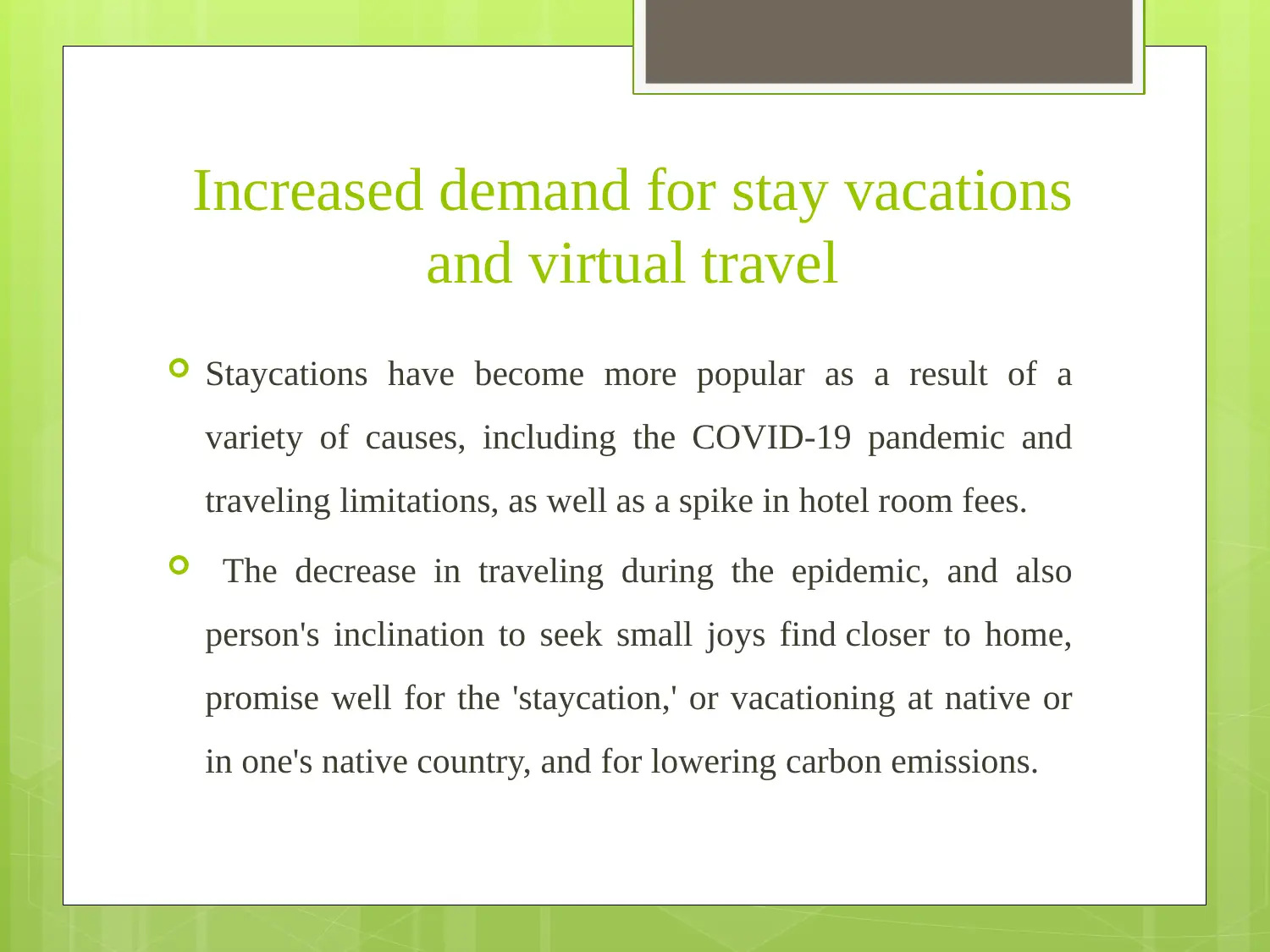
Increased demand for stay vacations
and virtual travel
Staycations have become more popular as a result of a
variety of causes, including the COVID-19 pandemic and
traveling limitations, as well as a spike in hotel room fees.
The decrease in traveling during the epidemic, and also
person's inclination to seek small joys find closer to home,
promise well for the 'staycation,' or vacationing at native or
in one's native country, and for lowering carbon emissions.
and virtual travel
Staycations have become more popular as a result of a
variety of causes, including the COVID-19 pandemic and
traveling limitations, as well as a spike in hotel room fees.
The decrease in traveling during the epidemic, and also
person's inclination to seek small joys find closer to home,
promise well for the 'staycation,' or vacationing at native or
in one's native country, and for lowering carbon emissions.
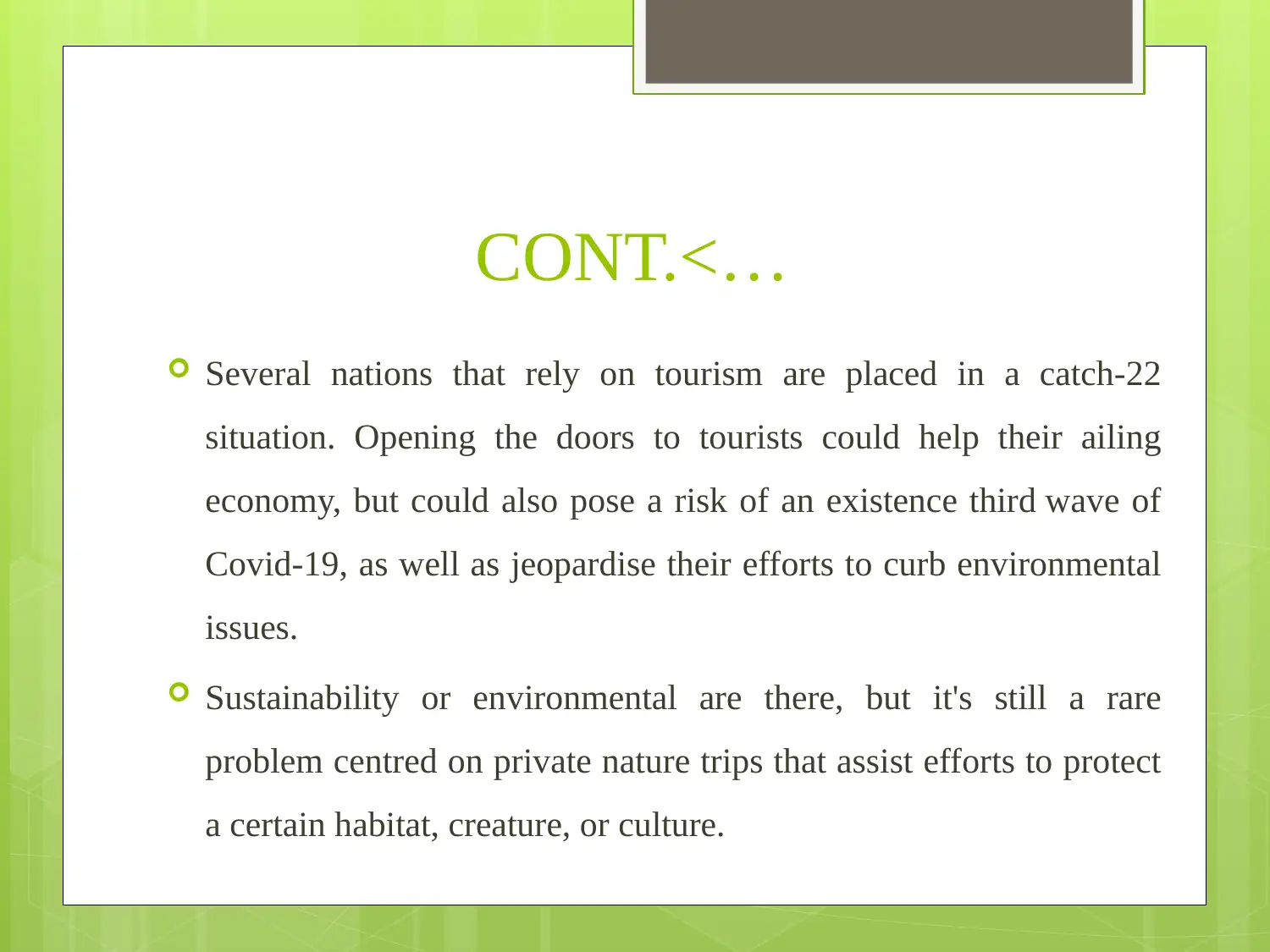
CONT.<…
Several nations that rely on tourism are placed in a catch-22
situation. Opening the doors to tourists could help their ailing
economy, but could also pose a risk of an existence third wave of
Covid-19, as well as jeopardise their efforts to curb environmental
issues.
Sustainability or environmental are there, but it's still a rare
problem centred on private nature trips that assist efforts to protect
a certain habitat, creature, or culture.
Several nations that rely on tourism are placed in a catch-22
situation. Opening the doors to tourists could help their ailing
economy, but could also pose a risk of an existence third wave of
Covid-19, as well as jeopardise their efforts to curb environmental
issues.
Sustainability or environmental are there, but it's still a rare
problem centred on private nature trips that assist efforts to protect
a certain habitat, creature, or culture.
⊘ This is a preview!⊘
Do you want full access?
Subscribe today to unlock all pages.

Trusted by 1+ million students worldwide
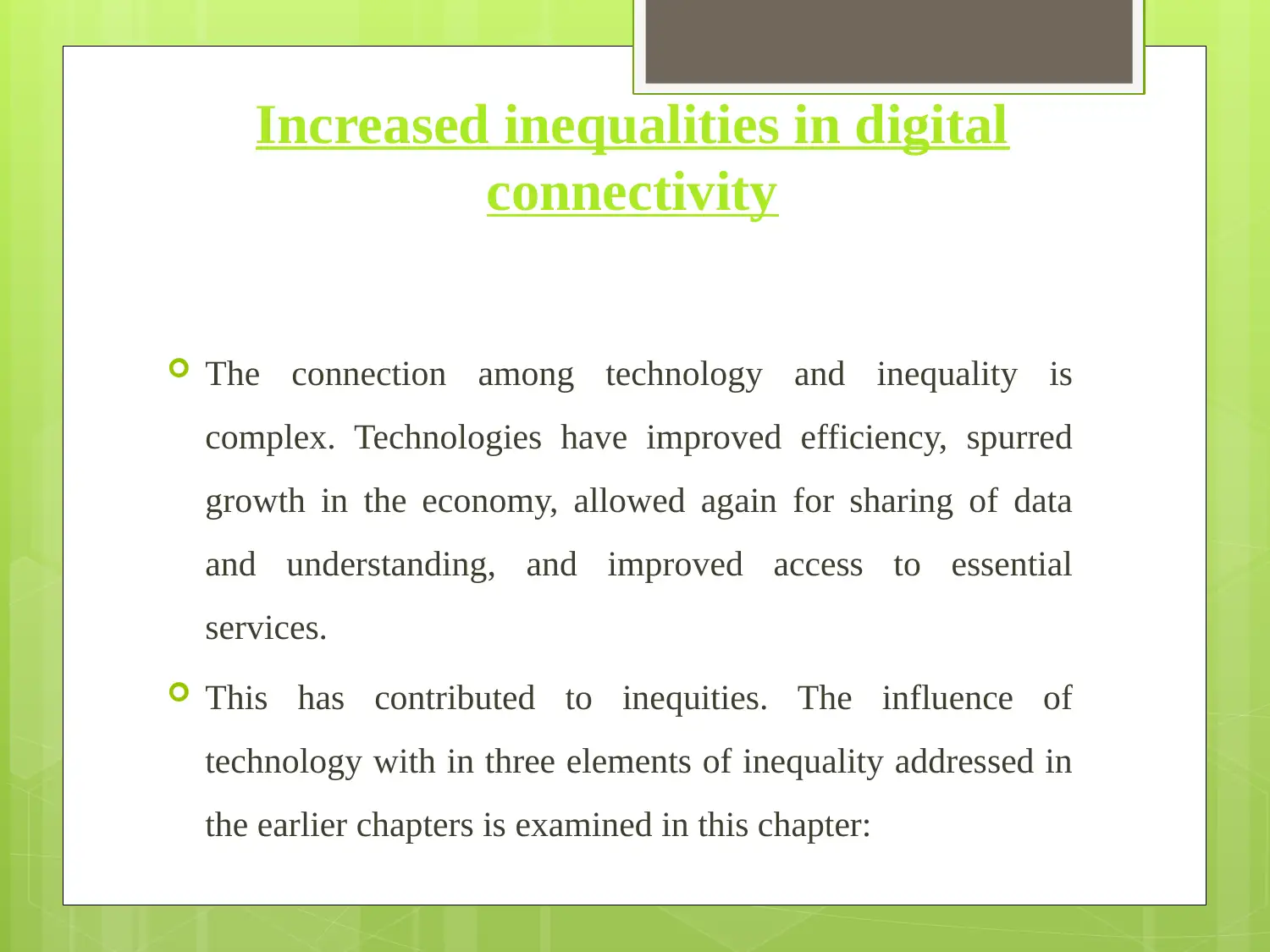
Increased inequalities in digital
connectivity
The connection among technology and inequality is
complex. Technologies have improved efficiency, spurred
growth in the economy, allowed again for sharing of data
and understanding, and improved access to essential
services.
This has contributed to inequities. The influence of
technology with in three elements of inequality addressed in
the earlier chapters is examined in this chapter:
connectivity
The connection among technology and inequality is
complex. Technologies have improved efficiency, spurred
growth in the economy, allowed again for sharing of data
and understanding, and improved access to essential
services.
This has contributed to inequities. The influence of
technology with in three elements of inequality addressed in
the earlier chapters is examined in this chapter:
Paraphrase This Document
Need a fresh take? Get an instant paraphrase of this document with our AI Paraphraser
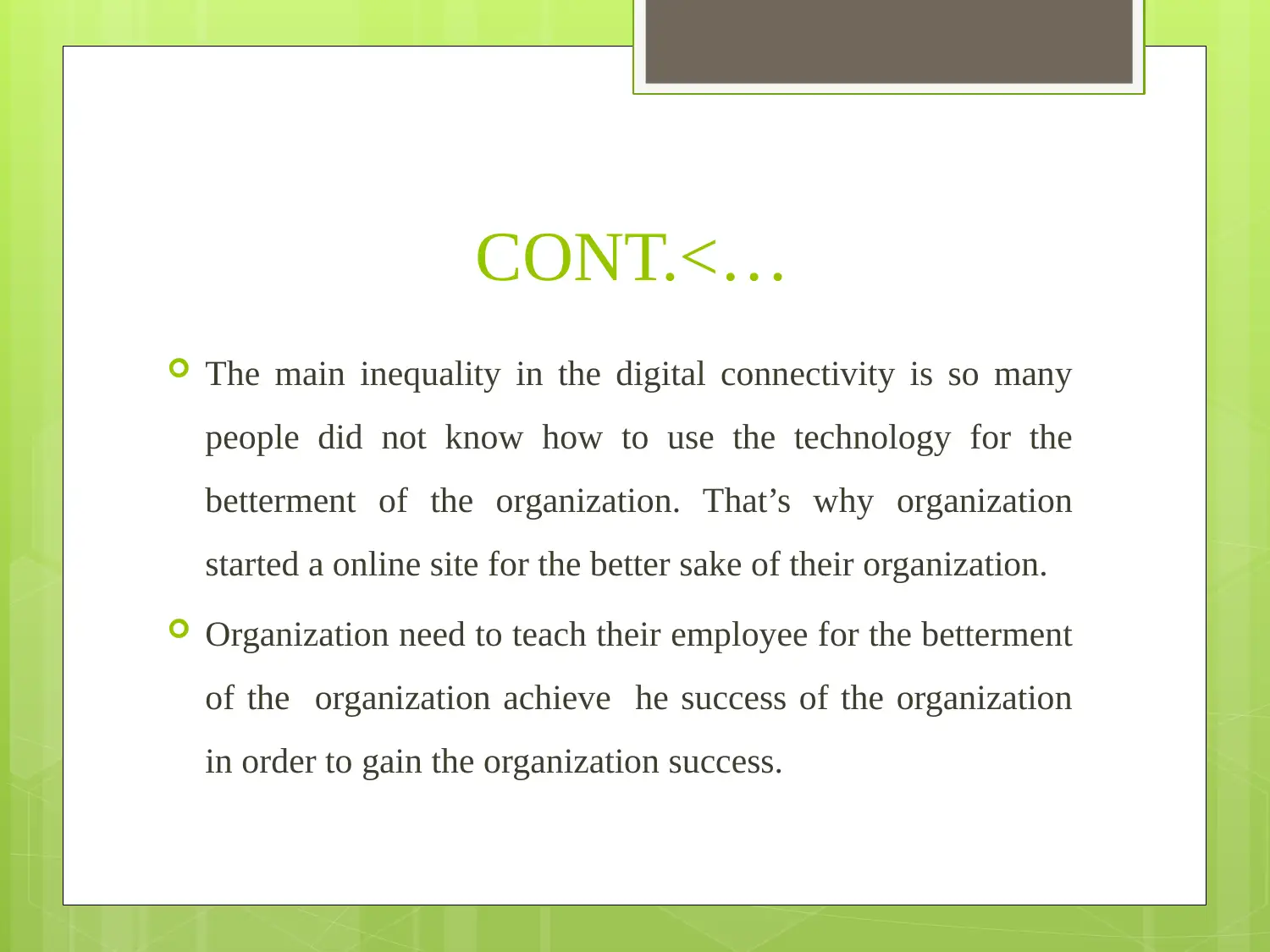
CONT.<…
The main inequality in the digital connectivity is so many
people did not know how to use the technology for the
betterment of the organization. That’s why organization
started a online site for the better sake of their organization.
Organization need to teach their employee for the betterment
of the organization achieve he success of the organization
in order to gain the organization success.
The main inequality in the digital connectivity is so many
people did not know how to use the technology for the
betterment of the organization. That’s why organization
started a online site for the better sake of their organization.
Organization need to teach their employee for the betterment
of the organization achieve he success of the organization
in order to gain the organization success.
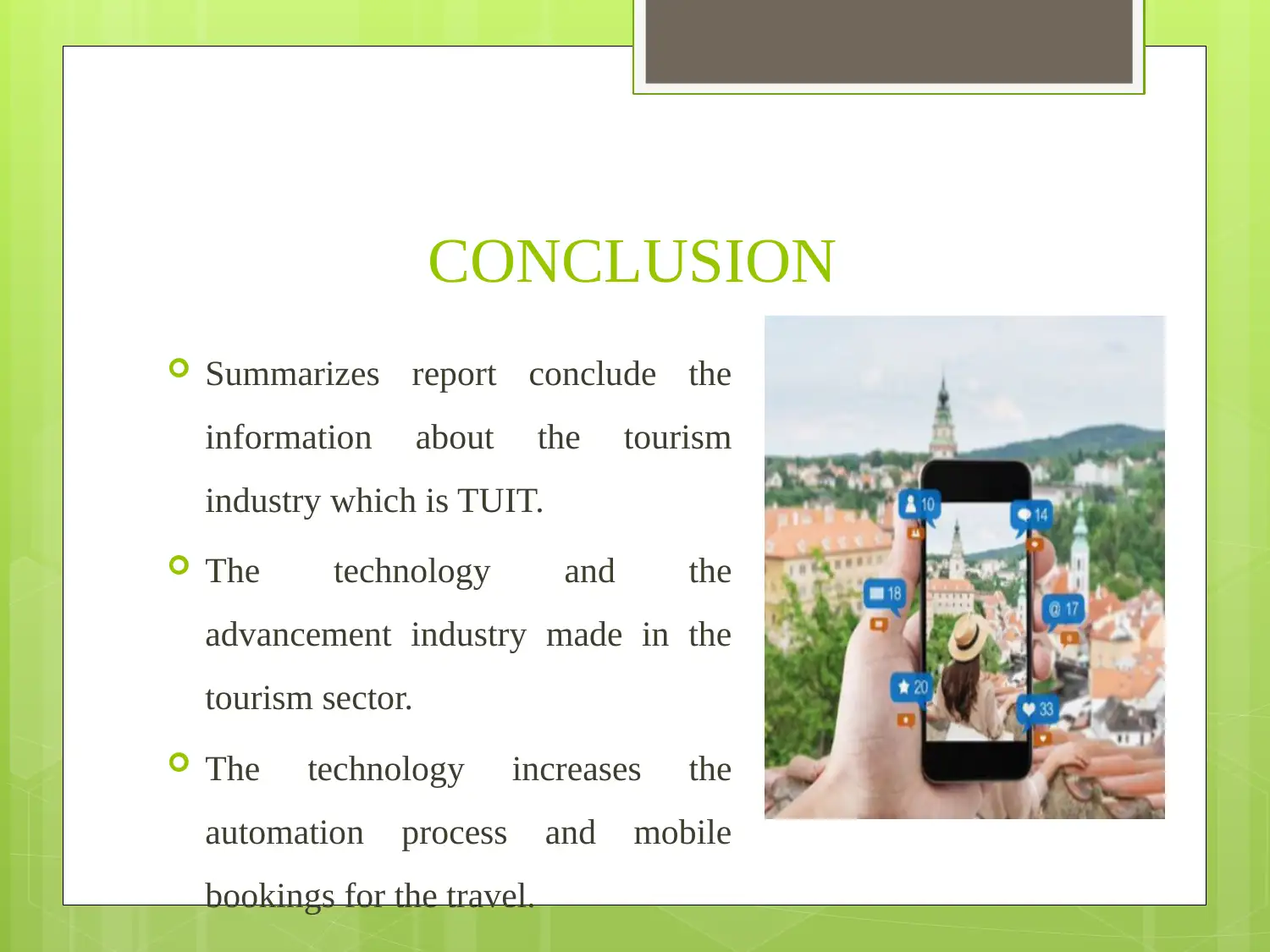
CONCLUSION
Summarizes report conclude the
information about the tourism
industry which is TUIT.
The technology and the
advancement industry made in the
tourism sector.
The technology increases the
automation process and mobile
bookings for the travel.
Summarizes report conclude the
information about the tourism
industry which is TUIT.
The technology and the
advancement industry made in the
tourism sector.
The technology increases the
automation process and mobile
bookings for the travel.
⊘ This is a preview!⊘
Do you want full access?
Subscribe today to unlock all pages.

Trusted by 1+ million students worldwide
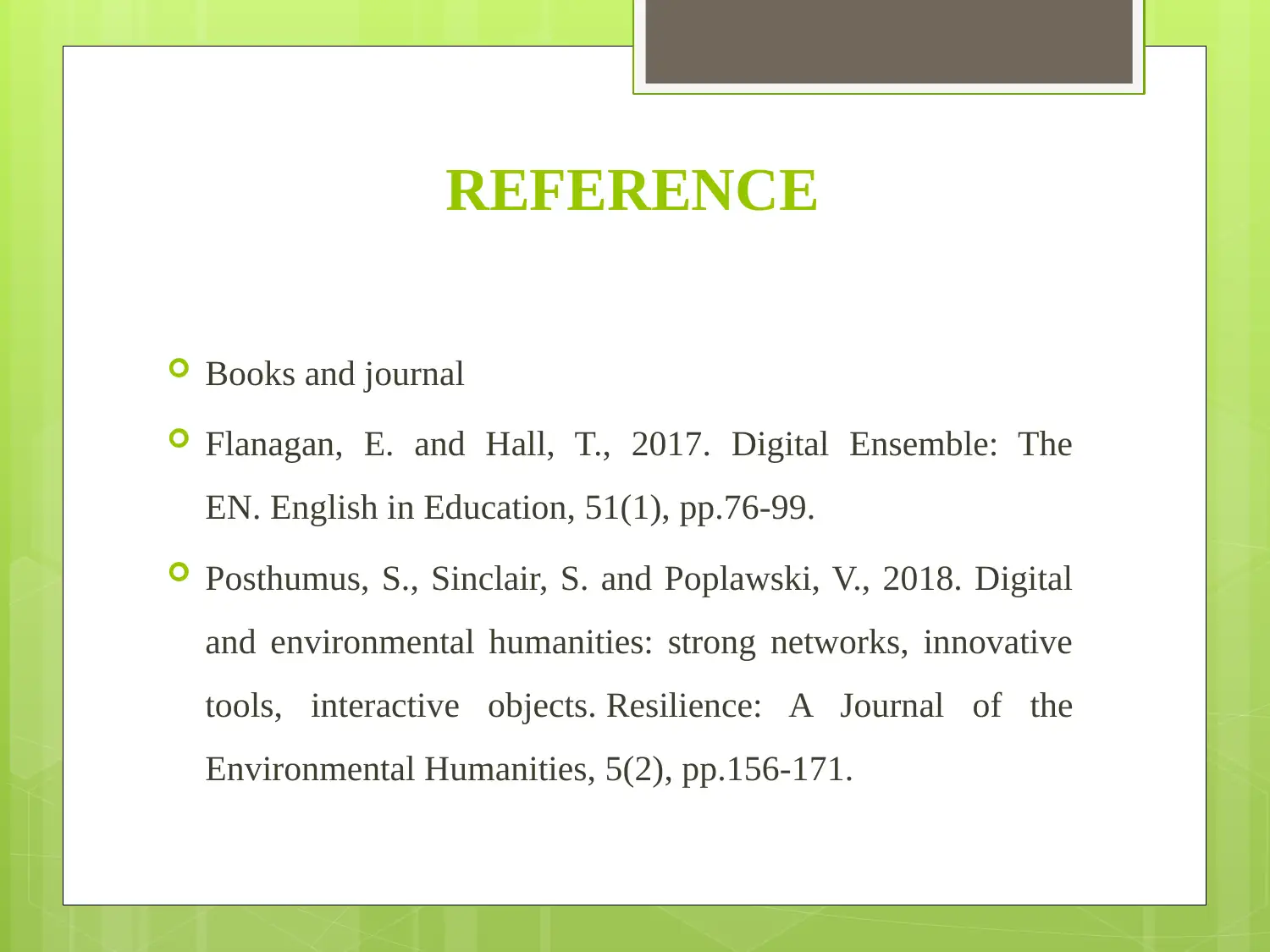
REFERENCE
Books and journal
Flanagan, E. and Hall, T., 2017. Digital Ensemble: The
EN. English in Education, 51(1), pp.76-99.
Posthumus, S., Sinclair, S. and Poplawski, V., 2018. Digital
and environmental humanities: strong networks, innovative
tools, interactive objects. Resilience: A Journal of the
Environmental Humanities, 5(2), pp.156-171.
Books and journal
Flanagan, E. and Hall, T., 2017. Digital Ensemble: The
EN. English in Education, 51(1), pp.76-99.
Posthumus, S., Sinclair, S. and Poplawski, V., 2018. Digital
and environmental humanities: strong networks, innovative
tools, interactive objects. Resilience: A Journal of the
Environmental Humanities, 5(2), pp.156-171.
1 out of 10
Your All-in-One AI-Powered Toolkit for Academic Success.
+13062052269
info@desklib.com
Available 24*7 on WhatsApp / Email
![[object Object]](/_next/static/media/star-bottom.7253800d.svg)
Unlock your academic potential
Copyright © 2020–2026 A2Z Services. All Rights Reserved. Developed and managed by ZUCOL.

